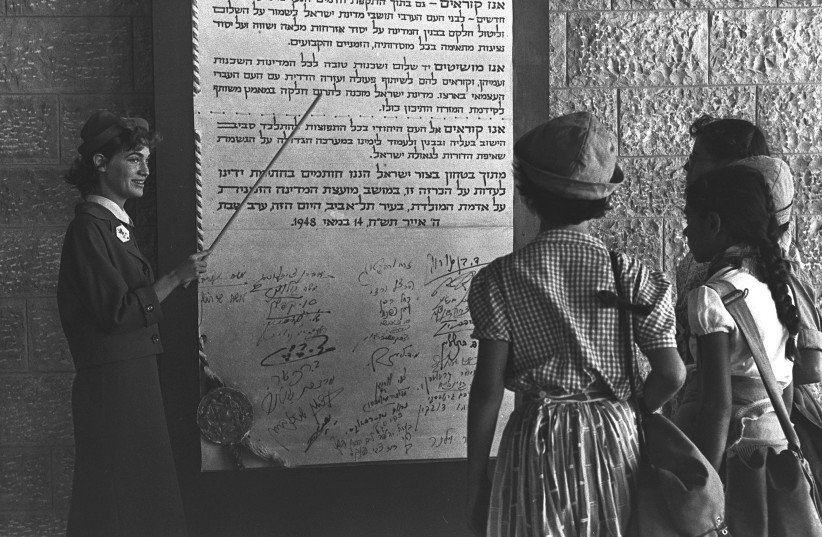Defense Minister Yoav Gallant defended the Declaration of Independence as the opening chapter of Israel's unwritten constitution during an Armor Corp ceremony marking the 50th Yom Kippur War anniversary on Thursday, warning that those who challenged the document's status damaged the state.
"Precisely when it seemed that there was nothing left to hold on to, in hours of great pain and terrible brokenness, we as a people held on to the good of the state, the flag, the crest, and the declaration of independence -- this scroll which is the opening chapter of the unwritten constitution of a country without a constitution," Gallant said at the Latrun ceremony.
"Even today, the Declaration of Independence embodies the foundations on which the State of Israel was built and exists -- it is a Jewish state, a democratic state, with equal rights for all its citizens."
Gallant continued by saying "Anyone who challenges the status of the Declaration of Independence damages the moral pillar of the State of Israel."
Gallant said that in such a period of polarization, it was needed to preserve the Declaration as a common denominator and to further practice its principles.
President Isaac Herzog also spoke at the memorial ceremony, saying that the country faced internal threats, but would not disintegrate. Herzog said however that a heavy price would be paid if Israeli leaders did not draw from the lessons of the Yom Kippur War about national responsibility and warning signs.
Renewed significance
The role of the document has been brought into contention following the September 7 hearing on the judicial reform's reasonableness standard law, in which the lawyer for the government, Ilan Bombach, said that the "hastily-signed" Declaration wasn't a constitutional article.
Bombach said that the declaration’s 37 signatories were not representative of the populace, so they had no authority to establish something that would serve as a constitution. Bombach insisted in the hearing that he and the government respected the declaration, but that that it wasn't a legal document that allowed for judicial review of Israel's quasi-constitutional basic laws. The petitions had called to strike down the basic law amendment on a reasonableness standard, and the role of these articles and undefined boundaries between different branches of government has been central to the reform debate.
The statements by Bombach drew criticism within and without the courthouse, with the Yesh Atid Party claiming that Bombach went "against the Declaration of Independence."
"There is no clearer proof that there is an anti-Zionist, anti-Israeli, anti-democratic government in Israel that will burn the pages of history and diminish the founders of the state for despicable political considerations," Yesh Atid said on September 12 on social media.
Court Vice President Uzi Vogelman argued that Bombach and the government were trying to diminish the constitutional weight of the declaration.
Supreme Court President Esther Hayut and other justices challenged Bombach on the source of the Knesset's authority to pass basic laws, which they contended was derived from the Declaration of Independence. Hayut and others on the bench believe that they have the authority to strike down basic laws to protect Israel's democratic and Jewish character. These values are established by the Deceleration.
More conservative justices such as Noam Sohlberg argued that founder David Ben-Gurion was against judicial review based on the Declaration. Justice David Mintz told Attorney-General Office representative Aner Helman that the connection of the Declaration to judicial review of basic laws was an invention from nothing.
The Declaration has been used as a rallying banner by anti-judicial reform factions in opposition to the legal overhaul. Israel lacks a constitution, but opposition factions have called to enshrine the Declaration of Independence, which lists dozens of aspirational rights not explicitly enshrined in Israeli law.
Opposition Yair Lapid in February submitted a bill for Basic Law: Declaration of Independence to enshrine the scroll as constitutional. Several NGOs and academic groups have called for the renewal of the constitutional process that included a similar law. During protests, the scroll has been printed up and used as a banner and passages have been plastered onto signs.

